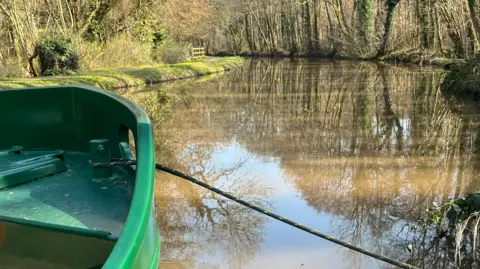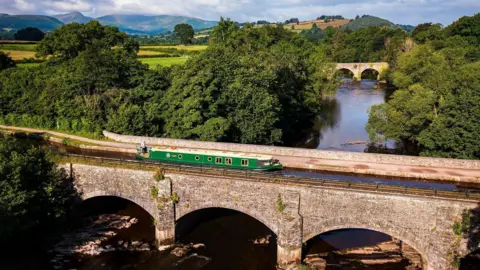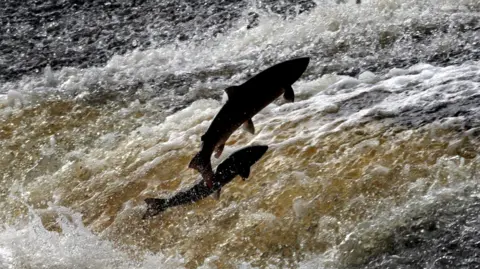Emergency water supply for at-risk canal costing £100k a week
 BBC
BBCAn historic canal will be given an emergency water supply to stop it from running dry in days.
The Canal and River Trust, which runs the Monmouthshire and Brecon Canal, has used money which was earmarked for repairs to buy a short-term supply from Welsh Water.
But the charity said this was a "stop gap" and it could not continue "to shoulder the full financial burden" because, if recent dry weather continued, it could cost up to £100,000 a week to remedy.
Welsh Water said it was pleased the agreement did not incur costs for customers or risk drinking water.
Water will start being taken from the Usk Reservoir between Brecon and Llandovery from the early hours of Saturday.
The charity said the cost would vary depending on rainfall and therefore river levels, but warned if current conditions persist, "it's likely we'll be paying as much as £100,000 per week".
It said it had diverted money away from planned maintenance and repairs to secure "a stop gap water supply".
It added this would have consequences for the its programme of maintenance and was therefore a "risk" for the England and Wales canal network.
The difficulties facing the canal were first outlined in a letter sent to local businesses by Glandŵr Cymru, the Canal and River Trust in Wales, in February.
It explained the 225-year old canal, which once transported iron and coal to Newport docks, had relied on funnelling water from the River Usk and its tributaries, which accounted for between 80% and 90% of its water supply.
Recent changes in legislation, designed in part to protect rivers in the face of climate change, mean licences are now required, restricting the amount of water that can be taken.
Now, the charity fears the dry start to 2025 means the canal could run start to run dry in days without imminent rainfall.
A petition in the Senedd, calling on the Welsh government to help preserve the canal, has obtained more than 10,000 signatures.
 Beacon Park Boats/As You See It Media
Beacon Park Boats/As You See It MediaThe River Usk is a designated special area of conservation protected by law, due to its importance for rare wildlife including the Atlantic salmon, which is threatened with extinction from Wales.
Environmentalists warned limits on the water taken from the Usk were needed so species and habitats had sufficient water to survive.
Mark Evans, director of Glandŵr Cymru, accepted this, but said, were the canal to dry out, the effects on the historic structure and thriving ecology could be catastrophic, with jobs and tourism in south Wales irreparably impacted.
Richard Parry, the Canal and River Trust's chief executive, said it was not "sustainable for a charity to shoulder the full financial burden of this new legislative requirement".
"The Monmouthshire and Brecon Canal has never before faced such restrictions to its water supply or had to pay for the water it needs to stay open for the public to enjoy and for the nature that depends upon it to thrive," he said.
"While this sticking plaster solution buys us some time, it is unfortunately short-term only. The pressure remains to urgently find a viable long-term solution for the canal.
"We will continue to call on the Welsh government to help secure a more sustainable future for this beautiful canal that brings so much to the area."
 PA
PAThe Welsh government previously said "protecting and enhancing our environment and natural resources is key to addressing the climate and nature emergencies".
It added any arrangement between the canal and Welsh Water would be a commercial contractual decision in which it should not be involved.
Welsh Water said it was "pleased to have come to an agreement to support the Monmouthshire and Brecon Canal that covers the cost of providing the water and doesn't incur additional costs for our customers or put at risk the supply of drinking water over the summer".
"We will continue to work closely with the Canal and Rivers Trust, Natural Resources Wales and the Welsh Government on a longer-term solution that can support the canal beyond the coming year," it added.
